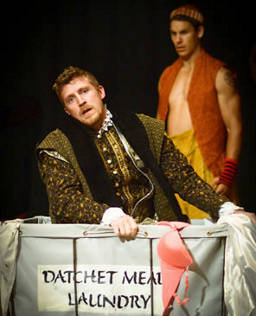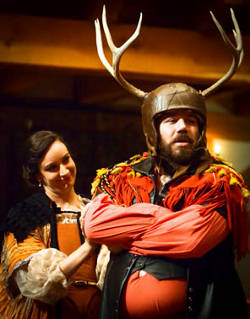Summary 
Final preview of a touring production boasts a very good Falstaff and Ford and is performed with tongue-in-cheek energy although somewhat hampered by uneven supporting performances. Lightweight comedy enlivened by Falstaff's interaction with the audience and delivered with liberal doses of spirited contemporary music.
Design
Directed by Rob Clare. Costume design by Jenny McNee.
Cast
Stephanie Holladay Earl (Mistress Ford), Patrick Earl (Ford/Simple), Bridget Rue (Mistress Page), Fernando Lamberty (Page), Emily Joshi-Powell (Anne Page/William Page/Nym/Rugby), Rick Blunt (Falstaff), David Millstone (Bardolph/Caius), Patrick Midgley (Pistol/ Slender), Russell Daniels (Host/Mistress Quickly), Joey Ibanez (Fenton/Shallow), Colin Ryan (Sir Hugh).
Analysis
Rob Clare directs the final preview performance of The Merry Wives of Windsor at the American Shakespeare Center's Blackfriars Playhouse. The youthful cast of eleven, preparing to embark upon a regional tour, provides a half hour of singing and music from the stage, beginning with The Beatles' "I Want to Hold Your Hand" and two strumming guitars along with a husband and wife playing mandolin and tapping rhythm on a wooden bench. Rick Blunt works the still-arriving crowd - "you can talk; no one is taking a test" - encouraging on-stage concession sales (especially local Virginian hard cider) and selling raffle tickets for an autographed-by-the-cast production poster. The performers onstage expand with added acoustic guitar and keyboards, and Blunt demurs to Cyndi Lauper's "Girls Just Wanna Have Fun." The song, like most of the others, reflects at least a little on the play that is about to start, and the ensemble adds a flute and washboard rhythm for a rousing "Mexican Lucky" - "we've come too far to give up who we are" - dancing more than a little between the gallants' stools onstage, six stage left and six stage right. A couple more songs conclude the preshow entertainment, "The Most Beautiful Girl in the Room" with its clever-funny lyrics - "you're so beautiful you could be an air hostess in the '60s" - followed by big brassy horns enhancing The Weather Girls' "It's Raining Men" along with its high-energy refrain: "halleluiah!"
The usual ASC fun facts - no lighting effects, interaction with the audience, live music - are provided by two of the performers, Russell Daniels and Colin Ryan, pretending to argue which of them is portly enough to play fat Falstaff: "Sir John's the role for me!" The argument becomes a drinking game as they list off Shakespearean playing conditions, sipping after every fact: "drink!" As they become a little drunken, Blunt intervenes, insisting he will himself play Falstaff and that Ryan, who specializes in accents, will play Sir Hugh Parsons - he can also do Canadian: "let's go shoot some moose, eh?" - with Daniels designated to portray Mistress Quickly in drag.
Clare's ensemble interacts with the audience throughout the production. Sometimes they address the first few rows of the audience or the patrons in the slightly elevated and railinged Lords' Chairs, but usually they interact with the people seated on the Gallants' Stools. Blunt's Falstaff, in particular, establishes a rapport with the nearer audience members, frequently making eye contact and smiling and winking, and at 1.4 he rips open his long leather coat, leans way over toward the front row, and shakes one shoulder suggestively like a stripper. He garners the show's heartiest laughter with his superbly timed 3.5 commentary - "I have a kind of alacrity...in sinking" - and 4.2 the audience joins him in laughter as he adjusts his voluminous fake breasts. Bridget Rue's Mistress Page also gets in the act, reading a 2.1 letter and at "you are not young" firing a dirty-look challenge to someone who laughs within the audience. She seems to thoroughly enjoy the letter and poem, having the audience shout out guesses at rhymes - night! light! might! - and moments later, before the 2.3 duel, Daniels' difficult-to-understand Sir Hugh mutters away, handing his precious Bible to a young girl seated on a Gallant's Stool.
Clare lends the production some amusing touches - Rugby arriving 1.4 in something like a KISS rock-and-roll fright wig; the desultory William entering 4.1 with barely enough energy to dribble his basketball - but the show begins with its weakest moments. Slender and Shallow are overplayed for laughs they do not get, the former wearing a bad red Beatles wig with black glasses and multi-colored sneakers, the latter dressed in black like a Puritan, hunched at the waist, shouting and tapping a cane. Fernando Lamberty's Page exudes quiet confidence and manages to salvage the early scenes, and the production begins to sparkle with the 1.3 arrival of Blunt's big, bald, bearded Falstaff in red-fringed black leather, red shirt, black pirate's hat, and motorcycle boots. Blunt's Falstaff naturally fills the room, and his colorfully corny sidekicks melt into the background and are eye-candy rather than center-stage eyesores: Nym is a tough-talking biker chick in a face-guarded football helmet and black leather; and the towering junkie-like Bardolph shakes as if with Parkinsons, wearing a pilot's helmet, little round goggles, and a football player's shoulder pads, his bulbous red nose only apparent if one looks closely.
Blunt's Falstaff carries the production, wooing both wives 1.4 via love letters adorned with smarmy little hearts - "we will thrive!" - and matching wits with Mistress Page, a tough no-nonsense firecracker - "as sure as his guts are made of pudding" - as well as Mistress Ford, a tall thin Olive Oyl-type who seems to take Mistress Page's lead. But again, the supporting performances are uneven, with Fenton in tight black pants and Converse sneakers and Dr. Caius in red beret and form-fitting French sweater. Together, they are little more than a sight gag and an overblown accent, but Daniels delivers a richly realized Mistress Quickly. More than a heavyset man in drag, Daniels' Mistress Quickly wears red plastic glasses and a little white cap atop a mop of brownish-blond hair, and he makes faces and laughs huskily like Chris Farley in a devolving Saturday Night Live skit. He seems as if he could not wipe the impish smile from his face if he tried, thrilled with his character's Puck-like machinations.

Also memorable is Patrick Earl's fuming Ford, resisting his wife's kiss after recoiling from Bardolph and Nym thrusting their cuckolds' horns at him with their fingers. Earl's Ford rocks the house as a cartoon spy in his full-length leather trench coat, black cap, and sunglasses, whipping off the hat and glasses to soliloquize in a sputter with clenched fists. He concludes with a scream, a whisper, and a spit of the word "cuckold." During 2.3, after the Host kisses Dr. Caius full on the mouth to stop his French cheek-kisses, Ford follows the chiming of the clock with a count of his fingers, calculating the exact moment at which he can catch his wife in her supposed infidelity with Falstaff.
Blunt's Falstaff makes an ass of himself during the 3.2 and 3.3 wooing scenes - "let me die for I have lived long enough!" - with Mistress Page watching from a windowed door. The wives shout their lines with theatrical glee - "look: here's a basket!" - before beating him while concealing him from the furious Ford. The cast takes the tiniest of breaks for intermission, three of them returning to the stage - two with acoustic guitars, one pounding rhythm on his body: slap-stomp-slap - for an excitingly original variation on The Who's "Won't Get Fooled Again": "the morals that we worshipped will be gone." They are joined by a harmonica-player for a follow up of Genesis' "That's All" - "I could be wrong and you could be right" - and then a solo-guitar version of Bruno Mars' "Treasure." Their finale, while not quite the stunning musical experimentation of their cover of The Who, is nonetheless a crowd pleaser: the wives lead the cast - and some of the audience - through Bon Jovi's "You Give Love a Bad Name," belting out "shot through the heart, and you're to blame!" with infectious gusto.
The production resumes with Falstaff 3.5, bare of tummy and foot - "my belly is as cold as if I had swallowed snowballs" - then being convinced by the giggling Mistress Quickly - "bring this woman to evil for your good" - as Ford arrives. Earl manages to steal some of the comedic thunder from Blunt - not an easy task - spinning and flailing his fists at Falstaff when the old knight turns his back, then resuming sedate posture, only to contort moments later in a silent scream of murderous rage. The second humiliation of Falstaff takes place 4.2, Mistress Ford suggestively on her knees before Blunt's knight as Mistress Page again watches through the stage right door-window. The wives give each other a triumphant double-tap high five as they rush off to dress the knight like an old woman, and they manage to embarrass Ford as well: he mocks Shallow and his wife, yells sputtering at Mistress Ford, speaks directly to the big wicker laundry basket - "oh, I shall find your man!" - then lifts his wife bodily out of the way so he can continue his search. Falstaff is ultimately thumped with Sir Hugh's Bible as he scurries daintily offstage, complaining 4.5 "I was beaten myself into all the colors of the rainbow."

Shakespeare's rather weakly plotted story fizzles with the third and final humiliation of Falstaff 5.5, as the fairies emerge from the doors and curtain upstage in stringy coats, pointy masks, and gloves with claws for fingers. Blunt's Falstaff - wearing a football helmet fitted with antlers - precedes them, lewdly stomping his hoof in a makeshift dance like "a Windsor stag." He sprawls downstage, his legs spread wide, inviting the wives to "each a haunch" and referring to himself gamely as "wood man." But the fairies make their approach, hissing and humming, barking and crying out like animals, one of them pounding a timpani rhythm, and then they pounce, tickling and poking and pinching Blunt's Falstaff. The production concludes with Mistress Quickly peppering the stage with firework poppers, lending some noise and energy to Shakespeare's conclusion of loose ends and happy endings (well, except for Falstaff).